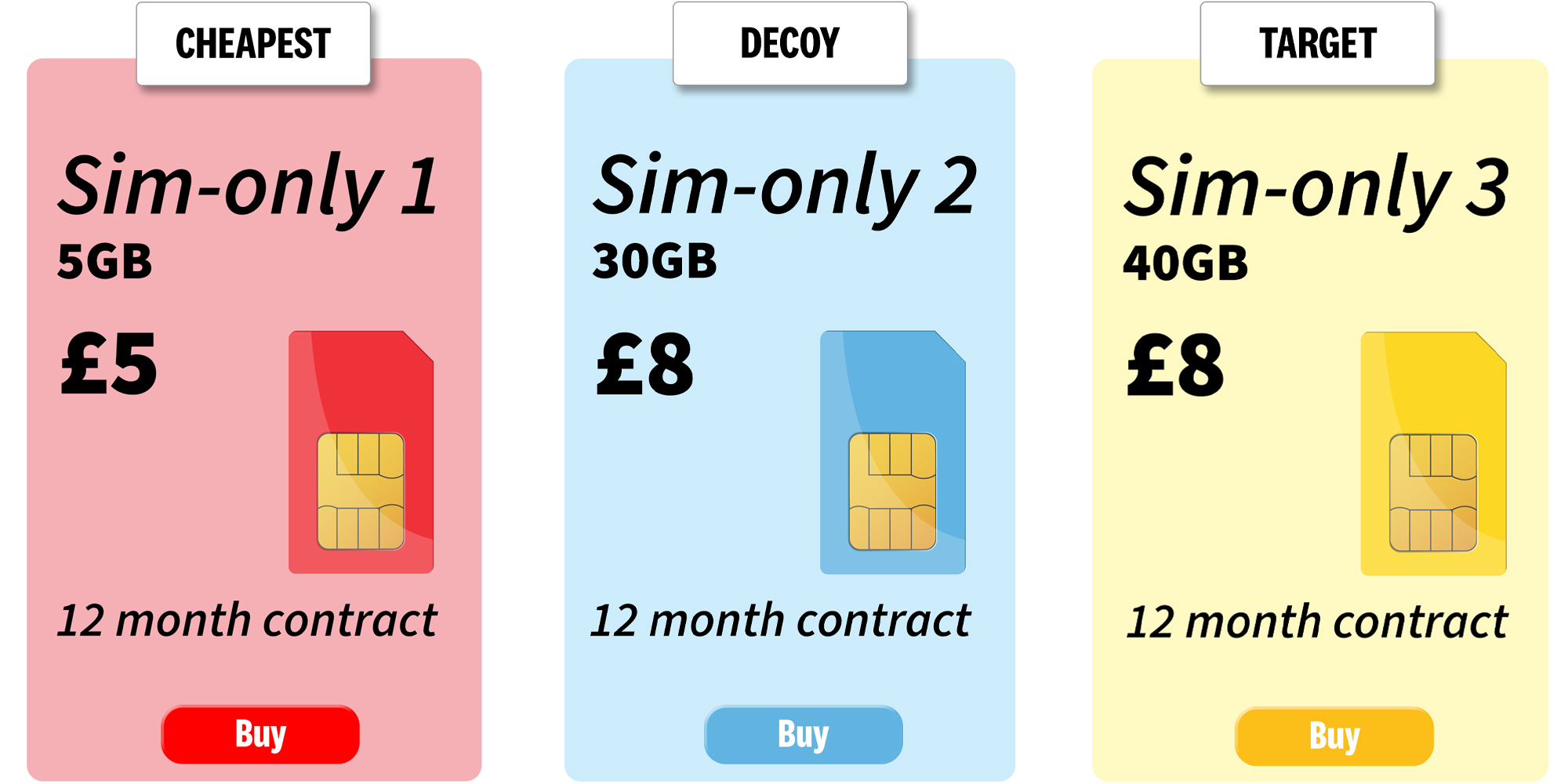Shopping for a new broadband or mobile deal isn’t always easy, as an increasing number of brands line up to convince you their deals are the ones worth your time.
And our latest research has uncovered an interesting marketing trick – decoy pricing –that some providers may employ to subtly nudge you towards a decision that’s more favourable to them than it is to you. Read on to learn how they can draw on the power of psychology to convince you to pay more without even realising it.
Discover the best and worst mobile networks or compare the best and worst broadband providers.
What is decoy pricing?
Decoy pricing is essentially a marketing trick that sees providers advertise decoy deals that are actually not particularly attractive on their own. We think they have a simple reason for including them; to make other options more appealing – especially options that are on the pricier side. It means that when you look at the list of deals on offer from a given provider, a pricier one you might have discounted suddenly doesn’t seem so bad. Put simply: providers might be intentionally pushing you towards their target by making it look like a better deal.
But even if the provider doesn’t explicitly set out to manipulate anyone, our research shows that as many as a quarter of people can be pushed towards a target deal if a decoy option is included. This puts a reasonable proportion of customers at risk of paying more than they need to – possibly by choosing a more expensive deal than they require, possibly by committing to a deal that ultimately has a higher standard tariff.
How much could decoy pricing cost me?
When we tested the effect of decoy pricing in the broadband market, using experimental research, we found that around one in six people chose a package that they would reject if a decoy deal wasn’t present. In the scenarios we presented, choosing a pricier deal would lead to them paying from £36 to £120 more per year.
By making a pricier option more attractive, providers could convince you to sign up for a deal that’s faster than you intended to sign up for. An increasing number of deals with speeds exceeding 300Mbps are becoming widely available – but if you don’t have a large household, or enjoy gaming, they may be surplus to your needs.
Choosing a higher speed deal could also see you pay more longterm – even if it costs the same amount as another deal when you sign up. Keep in mind that when your minimum-contract period ends, you’ll move onto a standard broadband tariff that can cost a lot more than the introductory offer. Standard tariffs for higher speed deals are also usually pricier than they are for lower speed deals, no matter the introductory price.
How can I avoid paying more?
When you’re looking for a broadband deal, go in with a plan – know what kind of speed you require so you’re not tempted to sign up to something pricier than you need. Our guide on how to tell what broadband speed you need is a good place to get started.
There’s nothing wrong with accepting a higher speed deal if it’s the same price as a slower speed deal you would otherwise pick. However, keep in mind that it is likely to cost more than your original choice when your minimum contract term ends – our research has shown that the jump from an introductory tariff to a standard tariff can be as large as 100%.
Keep track of when your minimum contract period ends and be sure to haggle and/or switch when the time comes.
Our latest research shows that switching at the end of your contract can lead to savings as high as £165 per year for broadband customers and £146 for mobile customers.
Decoy pricing and the mobile market
You won’t be surprised to discover that broadband providers aren’t the only ones who might be using marketing psychology in an attempt to influence your behaviour. We also spotted suspected decoy deals in the mobile market where there’s a huge array of deals with different amounts of data.
That means that deals with very high or unlimited data are often made to look very appealing, when really the typical user only needs around 5GB each month.
Yet take a quick look at provider sites and it’s not uncommon to see what seems like a small price increase for a big jump in data – for example, 5GB per month for £5 while a whopping 50GB costs just £8. That £3 a month difference may not be huge, but for many it’s still a waste of money – the vast majority won’t use anywhere near that much data each month.
The rules here are similar as for broadband – if you spot a deal that offers more data for the same price as a lower data deal then you don’t need to feel like the victim of marketing. But before you even start looking at deals, be aware of how much data you typically use each month and don’t be tempted to spend more to get extra.
Get started using our guide on how to keep track of your mobile data to understand how much you need.

Other things to watch out for when shopping for a broadband or mobile deal
Choosing a good broadband or mobile deal isn’t only about being en garde when it comes to marketing tricks – especially when providers will be jostling for your attention. Here are our other tips for ensuring you get a great deal:
Check the whole cost of the contract – particularly because many providers will increase the amount you pay every spring. Both major broadband and mobile providers put prices up every year so you could be forced to pay as much as an extra £3.50 per month from next spring, depending on which deal you commit to. Providers can also discount the first few months of a deal which make it seem more appealing that it really is
Don’t sign up to a deal without checking what’s available from other providers first – particularly if your current provider drops you an email to share a new special offer. Use Which? to compare broadband or mobile services to check you definitely can’t do better.
Don’t be tempted to take on extras you don’t need – whether it’s a wi-fi guarantee, an even higher data allowance or a streaming service you don’t need, additional ‘perks’ often also come with a higher cost. Carefully assess whether you’ll need any extras before you commit.
Want to find out more about decoy pricing in the broadband market? Read our full report.




